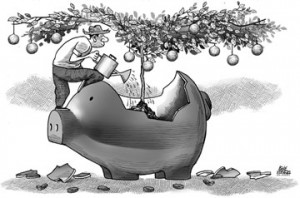
But it bears reminding.
Three valuable insights were given by Norio Usui, senior country economist of the Asian Development Bank, in his presentation to business leaders in Cebu City the other day.
One is that no matter how “bullish” or optimistic growth statistics appear, you have to check the trickle-down effect.
He noted that despite the average 3.9 percent Gross Domestic Product (GDP) growth in the Philippines from 2000 to 2010, and bright prospects of even higher growth, (6.4 percent in the first quarter of 2012 is sending government officials on a high), there were more poor people.
The percentage of poverty incidence actually grew from 24.9 percent to 26.5 percent.
The wealth apparently is making rich people more prosperous, and growing the ranks of the poor.
“Why is econominc growth not benefitting the poor?” he asked.
He showed more slides of a less known statistic — labor productivity. Lo and behold, the graph showed an almost flat line runing over 15 years from 1990 to 2005.
This is food for thought for schools and business enterprises in evaluating human capital, and what investments are needed to pump up training and the quality of education.
Second, minimum wage and high cost of electric power are not valid excuses for saying the country is not attractive to investors.
Japan pays much higher floor wages but that doesn’t drive away business, he said.
It’s a relief to hear an ADB official demystify the rhetoric of business owners who increase prices, and blame the fact that the Philippines has the highest electric tariff in Asia.
A closer look at the cost structure of manufacturing or electronics showes the share of electric bills is 2 percent to 5 percent only.
Third, something’s missing in the choice of products and enterprises for which we devote our energy and time.
Usui suggested running on “two legs”.
The BPO industry, with all the wonderful advantages Filipinos have in English speech and empathetic communication, is a sturdy leg.
But the balance would be provided by a second leg in manufacturing and industry, which can provide more jobs for a greater number of Filipinos, especially those from rural areas who come to the city with big dreams.
Not everyone can get a college degree and qualify for a BPO job.
If we find the right combination, and diversify the economy’s big ticket investments, we stand a better chance of fighting poverty and attaining a more just sharing of the harvest, what economists would call “inclusive growth”.